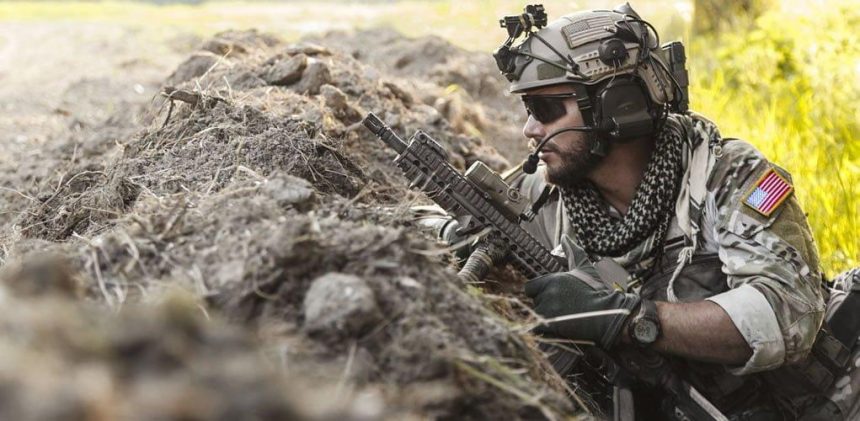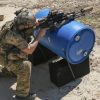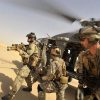Military life is eventful and communication is one of the most important parts. There are certain military expressions and terms used in the U.S. Military. Especially in combat, where communication needs to be sharp, short and meaningful. The U.S. Military has waged wars around the globe for decades under the Global War on Terror campaign. They have shaped their military skills and tactics, especially with wars in Iraq and Afghanistan.
With high intensity of engagement in hostile areas, it was crucial to simplify communication with new terms/acronyms and military expressions. We have created a list of military expressions and shortcodes that are associated with the action of the coalition troops in Iraq and Afghanistan. For each military expression and term, we added brief explanations and translations.

The simplified communication is used by regular soldiers, airmen, special operations forces and all others in need, and mostly by all coalition forces. No matter if you are serving in the 82nd Airborne Division, U.S. Army Special Forces or as a Navy SEAL, you will understand.
Glossary of military expressions and terms
| Angel | (Anjel) soldier killed in combat. Usually, the term used by some health care professionals, like combat medics. |
| Battlefield Airmen | Battlefield designation for members of the Air Force Special Operations Command (AFSOC). Their task is to rescue downed pilots, ensuring control of the battlefield, weather reports. The term is relatively a new one, even though the Airmen perform their duties for years. |
| Battle Rattle | This is almost 50 pounds of equipment, clothing, over a vest, helmet, and ammunition to the guns. |
| BIAP | Baghdad International Airport, thus Baghdad International Airport. |
| Bombaconda | Nickname for Anaconda base which is near the town of Balad. It got the name due to frequent mortar attacks by militants. |
| CC | Country Coalition, that coalition country. A country that participated in Operation Iraqi Freedom called together. “Coalition of the willing”. |
| CHU | Containerized Housing Unit. |
| CHUville | Base/opinion consisting of several CHU. |
| Death Blossom | The frequent and unfortunate practice of Iraqi security forces when faced with the enemy. The experience of coalition troops is when they become the target of Iraqi soldiers even a weak fire either flee or run a massive fire in all directions, and it is called Death Blossom. |
| DFAC | Dining facilities. DFAC tend to be well equipped (a standard part of the TV), and often ornate decorative style cafes (eg sports trophies). |
| Dirt Sailor | Label for units of Navy’s Construction Battalions. In Iraq, the term began to be used in conjunction with seafarers who fulfill the role of a typical seaman. |
| FOB | Forward Operating Base, thus outpost operational base. |
| FOB Taxi | The car that never leaves the FOB spaces. |
| Fobbit | A soldier, for example. technician, who never abandons security fob. |
| FRAGO | Fragmentary order, something like “rip command.” In essence, the abbreviated form of an operational command. It is usually issued on a daily routine. Facilitates overcoming bureaucratic obstacles, but unlike operating order (OPORD), it must be based on other orders. |
| Frankenstein | Vehicles Marines have been added to the users according to their own needs, especially additional armor. Led them to poor preservation of the original vehicle. Of the 30 000 vehicles deployed in Iraq and Afghanistan in December 2004, 8,000 did not have absolutely any armor protection. Only 6000 could be described as a fully armored, and 10 000 were equipped with various protective accessories. |
| Green Zone | A heavily guarded area in central Baghdad, located where several important buildings of the former regime. It is often known as the safest place in Iraq. Located where many state institutions and diplomatic missions in certain countries. |
| Gun truck | Heavily armored and armored vehicles to protect convoys. |
| GWOT | Global War On Terrorism, therefore, the global war against terrorism. |
| Haji [Haj] armor | Improvised vehicle armor for the Iraqi security forces (usually Humvee). It is any metal plate attached to the vehicle. |
| Haji mart | Any small shop selling things led Iraqis to foreigners. |
| Haji patrol | Patrol of tribes loyal to the Baghdad government. |
| Haji shop | Sell everything from cigarettes to pirated CDs / DVDs inside the wire. Owned by locals. |
| Hillbilly armor | Improvised armor literally from scrap. The soldiers often searched the trash to find a suitable steel plate, use them as a shield. Name obtained through 278th regimental combat team of the National Guard, State of Tennessee. Its member Specialist Thomas Wilson became famous when summoned up enough courage, and frankly asked Donald Rumsfeld, during one of his visits to Iraq, why should American soldiers dig in the trash to find the means to defend itself. It was probably one of the most important incentives to “armor” units operating in Iraq and Afghanistan. |
| IED | Improvised explosive device, almost most used weapon in attacks on coalition forces in Iraq and Afghanistan |
| ICDC | Iraqi Civil Defence Corps |
| Inside a wire | The term applied to the designation of any U.S. base perimeter. |
| ITGA | Interim Transitional Government of Afghanistan, the official Afghan government. |
| KAF | Kandahar Air Field, Kandahar’s airport, the main Allied base in southern Afghanistan. |
| KBR | Kellogg, Brown & Root, the largest contractor working for US-led coalition forces. |
| LN | Local National, usually a local person associated with the coalition forces. |
| Mortaritaville | Another name for the Anaconda base. |
| My [Mudzi] | Abbreviation for the word mujahedin. From about 2005, the term generally used for Iraqi insurgents by regular coalition forces. |
| Outside the wire | The area outside the FOB, a security perimeter. |
| OEF | Operation Enduring Freedom |
| OGA | Short for Other Government Agency, meant CIA. |
| OIF | Operation Iraqi Freedom |
| POG | People Other than Grunts, tulle security units. |
| PRT | Provintional Reconstruction Team, ie Provincial Reconstruction Team. Usually, the civilian workers who are there to coordinate the work and provide humanitarian assistance. |
| PSD | Personal Security Detail, even to the name of the private security agencies. |
| Red on red | Friendly fire among enemy forces, enemy fire at the enemy. The phenomenon usually in Iraq, and reported a few times in recent years. |
| Remfland | The area where support staff lives and work under security measures. |
| Shake and bake | A designation for bomb attack. It coming back from Vietnam (Shake and fry.) |
| TCN | Third Country National, that third country. Residents of a neutral country working for coalition forces. Usually, non-military personnel (workers, drivers). |
| TCP | TCP stands for Traffic Control Point, a checkpoint used to ensure control over the same area. |
| VBIED | Vehicle Borne Improvised Explosive Device, usually recognized as a car bomb. |
The war against terrorism is going on, so the US military improvizations. This is not the only and not the final list of terms and expressions used by the US military to simplify communication on the battlefield. Some are self-explanatory and others are completely cryptic, but they each have a specific and important (sometimes) meaning. But, don’t forget it’s not an official format. It is a slang forged by the soldiers itself. A more detailed list of military expressions, terms and acronyms can be found at Glossary of Military Acronyms.





